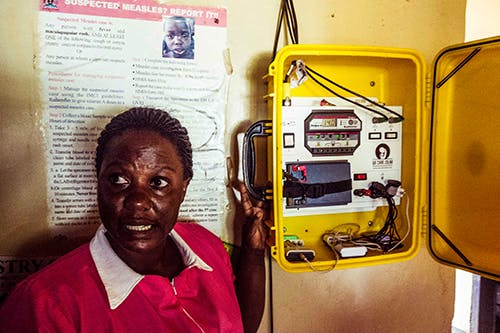I have a 2-year-old daughter named Opal. Much like me, she never sits down — she was even “standing” in the womb. She was a rare type of breech called footling breech. Other than the extra pain of having a C-section, I didn’t think much about the delivery. While lying in the hospital, I didn’t wonder if the power was going to stay on or if the doctors could properly see what they were doing; I just couldn’t wait to see my healthy baby. I now realize how lucky my daughter and I were to have proper medical care.
Earlier this year, I visited Uganda with the United Nations Foundation’s Global Entrepreneurs Council to learn more about how United Nations agencies use entrepreneurial solutions to save lives. During the trip, we visited Bussi Island, a fishing community in Lake Victoria with little to no electricity. There is only one small clinic on the island, and the only way to see a skilled doctor is to ride a fishing boat for an hour across the lake and then take a motor bike to the hospital.
I don’t know about you – but when it came time to give birth – I was not getting on a boat or a motor bike!
Before this year, on average, there were only three successful births a month in the Bussi clinic during the night. With no electricity or access to energy, midwives had to deliver babies at night using a small kerosene candle to see. There was no electricity for light, sterilization, or equipment.
Can you imagine having a baby in the dark? Scary!
When I arrived to the island, I saw a thriving clinic with lines of pregnant women outside. When I asked the nurse why so many women now use the clinic, she said, “Because of the yellow suitcase.” I wondered: How could a suitcase save a life?
An entrepreneur named Dr. Laura Stachel came up with an innovative idea – “the solar suitcase.” This easy-to-use portable power unit provides health workers with highly efficient medical lighting and power for mobile communication, laptop computers, and small medical devices. The basic system comes with 40 or 80 watts of solar panels and a 14 amp-hour sealed lead-acid battery.
This suitcase has enabled health workers to increase the number of successful live births in the clinic at night to up to 60 a month. I bet you will never look at your suitcase the same!
Globally, an estimated 289,000 women die annually from complications from pregnancy and childbirth. Lack of energy access is a contributing factor. That’s one reason the UN Secretary-General’s Sustainable Energy for All (SE4All) initiative is so important. In support of SE4All, the UN Foundation leads the Energy Access Practitioner Network – of which Dr. Stachel’s non-profit, We Care Solar, is an active member. We Care Solar is one of thousands of network members providing more people access to sustainable energy to lead healthier and safer lives, including solutions like the solar suitcase being installed in clinics across developing countries.
I will always value how important power is to giving birth. Next time you pack your suitcase, think about how a simple suitcase and entrepreneurs are saving lives.
Take action: Tell the UN that “better healthcare” and “reliable energy” is a priority for you with the UN’s MY World global survey: www.unf.myworld2015.org



 View All Blog Posts
View All Blog Posts